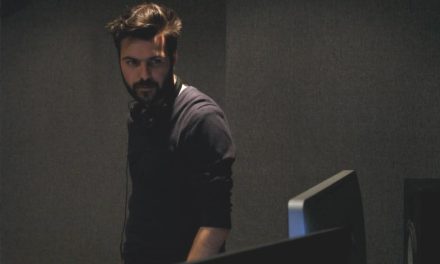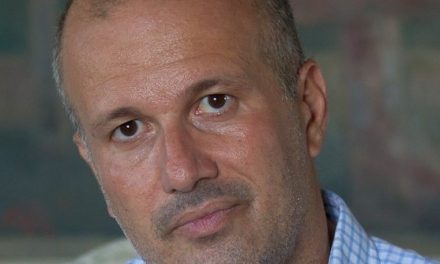The Greek Association of Film Directors and Producers (ESPEK) held a press conference titled “Give a little loving to Greek Cinema … or the need for a single cinematic policy” on Monday, November 26, 2018, in Athens, where film makers and producers expressed their views and concerns regarding existing mechanisms of state funding and cinema policy.
Film director Markos Holevas, member of ESPEK and director of the Hellenic Film Commission of the Greek Film Center (GFC) in 2007, welcomed attendants, while film director and ESPEK President Elina Psychou focused on ESEPK’s view that there is no comprehensive and uniform national cinema policy. Ministries dealing with cinema have not managed as yet to formulate this much needed unified policy. Psychou explained that the term policy refers to the whole spectrum, from the education of the audience to watch Greek cinema, to film academies, the production of films as well as their promotion and distribution, both in Greece, as a valuable cultural product and abroad, as an exportable product.
Elina Psykou
Noting that nine Ministries are involved in cinematography – the Ministries of Culture, Digital Policy, Telecommunications and Information, Finance, Economy and Development, Labour, Citizen Protection, Interior, Tourism and Education – Psychou underlined the need for coordination between them.
Psykou also referred to the problems that have rendered the existing legal framework obsolete, commenting that the creation of National Centre for Audiovisual Media & Communication (EKOME S.A.) and the introduction of cash rebate is a positive, long awaited development. However, there is a gap between the amounts allocated for cash rebate (25 million a year) and the regular Greek Film Centre (GFC)budget (2.5 million). Psykou emphasized the necessity to raise the GFC budget.
Filmmaker Vassilis Kekatos (“The silence of the fish when they die”, awarded at the Drama Festival and selected at this year’s Sundance festival) referred to the Greek state broadcaster’s (Hellenic Broadcasting Corporation – ERT) “Microfilm” funding program that has helped over the years in the realization of numerous short films and lamented its current static state. Kekatos also referred to the creation of a fund for short films announced by Deputy Minister of Digital Policy Lefteris Kretsos, noting it is an excellent development that the cinematic community had been expecting for years, but that it should not replace “Microfilm”.
Vassilis Kekatos
Film producer Fenia Kosovitsa (Blonde productions), as the first producer who had applied for cash rebate, in her comments that were read by film producer Amanda Livanou (Nedafilm), said that the introduction of the new set of economic incentives and the establishment of the National Centre for Audiovisual Media & Communication (EKOME S.A.) were positively received by the entire cinema community, as such incentives has been a long-standing demand for years. The implementation of the measure applies not only to foreign but also to Greek productions that finally see the cash rebate as an additional source of funding in the difficult financial Greek cinema landscape.
Nevertheless, there are issues that need to be clarified, so that the Greek cinematic community will be able to make the optimum use of the funding mechanisms. Greek filmmakers need to understand that EKOME is not a bank and European funding mechanisms need to recognize cash rebate as secured money. Noting that the staff of EKOME works with passion and speed, she underlined that although the establishment of EKOME is a very positive step, it doesn’t mean that all problems were solved. “Many difficulties remain and we ask the State to support Greek Cinema with the same passion it supports the EKOME initiative”, she concluded.
Film maker Alexis Alexiou (“Wednesday 04: 45″, Karlovy Vary Film Festival, Best Film Award by the Greek Film Academy) stressed that for every euro spent in Greece in film co-productions, three euros are reimbursed. The aim thus is to increase the money allocated to co-productions in order to increase the amount to be reimbursed to Greece.
Film producer Mary Drandaki said that apart from the delays in approvals and the lack of funding, there are problems caused by the bureaucracy of GFC and ERT, which reflects the lack of coordination between Ministries. Film maker and ESPEK member Holevas pointed out the absence of private television networks in the financing of Greek films. He commented that neither the State nor the private sector has realized the benefits of such an investment, nor has it put pressure on private law enforcement.
Dora Masklavanou, photo by Aris Rammos
Film director Dora Masklavanou referred to the necessity of changing the procedure of insuring auxiliary actors with a more flexible and less bureaucratic procedure. Film director Panayiotis Fafoutis talked about the need to create an educated public for Greek cinema. Markos Holevas referred to the Greek audience’s mistrust of Greek films, while he pointed out the speed at which EKOME operates in contrast to the other institutions.
Read also in our Filming Greece interview series: EKOME President Panos Kouanis explains why Greece is your next filming destination (and yes, it has to do with money), Director Dora Masklavanou on giving voice to the outcasts, Film Director Timon Koulmasis on the crossroads between individual and collective memory, Film Director Elina Psykou: Riding on the winds of fantasy through dark times.













